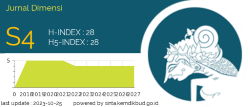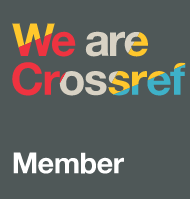PERSEPSI GURU TERHADAP KEPEMIMPINAN TRANSFORMASI SEKOLAH DAN KEMANJURAN KOLEKTIF GURU SEBAGAI PREDIKTOR ATAS KUALITAS PENGAJARAN DI KOTA BATAM
Abstract
Keywords
Full Text:
PDFReferences
Aritonang, R. L. R. (2007). Riset Pemasaran Teori dan Praktik. Bogor: Ghalia Indonesia.
Badmus, M. “Teachers’ Value Internalization and commitment to Implementation of National Junior Secondary School Home Economics Curriculum in South-western States of Nigeria”, Education, 128 (2), 163 – 168.
Caprara, V.G., Barbaranelli, C., Borgogni, L. & Petitta, L. (2003). “Teachers’, school staff’s and parent’s efficacy beliefs as determinants of attitudes toward school”, European Journal of Psychology of Education, 18 (1), 15 – 31.
Day, C. & Gu, Q. (2007). “Variations in the conditions for teachers’ professional learning and development: sustaining commitment and effectiveness over a career”, Oxford Review of Education, 33 (4), 423 – 443.
Daud, B. Y. (2007). “Budaya Sekolah Rendah: Hubungannya dengan Kepemimpinan, Komitmen Organisasi dan Pencapaian Akademik”, Tesis yang diserahkan untuk memenuhi keperluan bagi Izajah Doktor Falsafah.
Ebmeier, H. (2003). “How Supervision Influences Teacher Efficacy and Commitment: An Investigation of A Path Model”, Home Supervision Influences Teacher Efficacy and Commitment, 29 (3), 110 – 141.
Frick, W.T., Chadha, R., Watson, C., Wang, Y. & Green, P. (2007). “College Students Perceptions of Teaching and Learning Quality”, Education Tech Research Development, 57, 705 – 720.
Hanushek, A. E. & Rivkin, G. S. (2006). “Teacher Quality”, Handbook of the Economics of Education, Volume 2, 1 – 28.
Hausman, S. C. (2001). “Sustaining Teacher Commitment: The Role of Professional Communities”, Peabody Journal of Education, 76 (2), 30 – 51.
Hennessy, S., Ruthven, K. & Brindley, S. (2005). “Teacher perspectives on integrating ICT into subject teaching: commitment, constraints, caution, and change”, Journal Curriculum Studies, 37 (2), 155 – 192.
Hulpia, H., Devos, G. & Keer, V.H. (2010). “The Influence of Distributed Leadership on Teacher’s Organizational Commitment: A Multilevel Approach”, The Journal of Education Research, 103, 40 – 52.
Kanesan, G.A. & Anandan, K. (2006). “Pengaruh Kepemimpinan Transformasi Sekolah dan Efikasi Kolektif Guru Terhadap Komitmen Kualiti Pengajaran”, Badan Penerbit University Sains Malaysia Pulau Pinang, 29 (3), 1 – 14.
Kementerian Pendidikan Nasional (2010). Kepemimpinan Pembelajaran, Materi Pelatihan Penguatan Kemampuan Kepala Sekolah, Jakarta: Direktorat Tenaga Kependidikan Kementerian Pendidikan Nasional.
Kiu, L. T. & Pihie, L. A. Z. (2004). “Persepsi Guru terhadap Kepemimpinan Pengetua: Implikasi dalam Pengurusan Sekolah Bestari”, Jurnal Teknologi, 41 (E), 11 – 32.
Kotler & Keller, Kevin Lane (2009). Manajemen Pemasaran. Edisi Ke-12. Indonesia: PT.Indeks.
Kuncoro, Mudrajat (2003), Metode Riset untuk Bisnis dan Ekonomi, Penerbit Erlangga, Jakarta.
Laboratory for Student Success (LSS) (2002). “What Is A Quality Teacher?”, The Education policy and Leadership Center, Harrisburg, Pennsilvania.
Mansoer, Farid Wijaya (2008), Materi Pokok Metode Penelitian Bisnis, BMP EKMA 5104/3 SKS/Modul 1-9, Pusat Penerbitan Universitas Terbuka, Jakarta.
Nasution, D. (2008). “Senjangan Gender Terhadap Motivasi dan Self-Efficacy Pada Keberterimaan Teknologi Informasi”, Jurnal Organisasi dan Manajemen, 4 (1), 10 – 19.
Natuna, Daeng Ayub (2004), Pengantar Menjadi Guru, Pekanbaru: UNRI Press.
Nguni, S., Sleegers, P. & Denessen, E. (2006). “Transformational and Transactional Leadership Effects on Teachers’ Job Satisfaction, Organizational Commitment, and Organizational Citizenship Behaviour in Primary School: The Tanzanian case”, School Effectiveness and School Improvement, 17 (2), 145 – 177.
Nir, E. A. (2002). “School-based Mangement and its effect on teacher commitment”, International Journal Leadership in Education, 5 (4), 323 – 341.
Park, I. (2005). “Teacher Commitment and its Effects on Student Achievement in American High School”, Education Research and Evaluation, 11 (5), 461 – 48.
Peraturan Pemerintah Republik Indonesia Nomor 19 Tahun 2005 tentang Standar Nasional Pendidikan.
Peraturan Pemerintah Republik Indonesia Nomor 74 Tahun 2008 tentang Guru.
Peraturan Pemerintah Republik Indonesia Nomor 17 Tahun 2010 tentang Pengelolaan dan Penyelenggaraan Pendidikan.
Robinson, J. M. V., Lloyd, A. C. & Rowe, J. K. (2008). “The Impact of Leadership on Student Otcomes: An Analysis of the Differential Effects of Leadership Types”, Educational Administration Quarterly, 44 (5), 635 – 674.
Ross, A.J. & Gray, P. (2006). “School Leadership and Student Achievement: The Mediating Effects of Teacher Beliefs”, Canadian Journal of Education, 29 (3), 798 – 822.
Ross, A.J. & Gray, P. (2006). “Transformation Leadership and Teacher Commitment to Organization Values: The Mediatinf effects of collective teacher efficacy”, Canadian Journal of Education, 17 (2), 179 – 199.
Sarwono, Jonathan (2009). Panduan Lengkap untuk Belajar Komputasi Statistik Menggunakan SPSS 16. Yogyakarta: Andi Offset.
Satori, Djam’an (2010). Profesi Keguruan. Jakarta: Penerbit Universitas Terbuka.
Sinclair, C. (2008). “Initial and changing student teacher motivation and commitment to teching”, Asia - Pacfic Journal of Teacher Education, 36 (2), 79 – 104.
Situmorang, S. H., dkk. (2010). Analisis Data untuk Riset Manajemen dan Bisnis. Medan: USU Press.
Smolen, A. L., Hall, C. S., Liang, X. & Donald, M. S. (2006). “An Empirical Study of College of Education Faculty’s Perceptions, Beliefs, and Commitment to the Teaching of Diversity in Teacher Education Programs at Four Urban Universities”, The Urban Review, 38 (1), 45 – 61.
Su, Z., Hawkins, N. J., Huang, T. & Zhao, Z. (2001). “Choices and commitment: A comparison of teacher candidates’ profiles and perspectives in China and United States”, International Review of Education, 47 (6), 611 – 635.
Sugiyono (2008). Metode Penelitian Bisnis. Bandung: Penerbit Alfabeta.
Sun, J. (2004). “Understanding the Impact of Perceived Principal Leadership Style On Teacher Commitment”, ISEA, 32 (2), 18 – 31.
Suparto, A.S. (2007). “Kepemimpinan Transformasional Kepala Sekolah dalam Manajemen Konflik dengan Pendekatan Kecerdasan Emosional pada Satuan Pendidikan Dasar”, Didaktika, 2 (1), 244 – 258.
Tondok, S. M. & Andarika, R. (2004). “Hubungan antara Persepsi Gaya Kepemimpinan Transformasional dan Transaksional dengan Kepuasan Kerja Karyawan”, Jurnal PSYCHE, 1 (1), 35 – 49.
Umaedi, dkk. (2009). Materi Pokok Manajemen Berbasis Sekolah. Jakarta: Penerbit Universitas Terbuka.
Undang-undang Republik Indonesia Nomor 14 Tahun 2005 tentang Guru dan Dosen.
Universitas Terbuka (2010). Pedoman Penulisan Tugas Akhir Program Magister (TAPM). Jakarta: Penerbit Universitas Terbuka.
Universitas Terbuka (2007). Pedoman Mata Kuliah Seminar Penelitian. Jakarta: Penerbit Universitas Terbuka.
Universitas Terbuka (2009). Panduan Mata Kuliah Workshop Penelitian. Jakarta: Penerbit Universitas Terbuka.
Universitas Terbuka (2007). Pedoman Ujian Sidang Program Pascasarjana. Jakarta: Penerbit Universitas Terbuka.
Universitas Terbuka (2009). Katalog Universitas Terbuka 2009. Jakarta: Penerbit Universitas Terbuka.
Usman, Wan (2005), Materi Pokok Metode Kuantitatif, BMP EKMA 5103/3 SKS/Modul 1-9, Pusat Penerbitan Universitas Terbuka, Jakarta.
Wahyosumidjo (2005), Kepemimpinan Kepala Sekolah, Jakarta: PT. Rajagrafindo Persada.
Ware, H. & Kitsantas, A. (2007). “Teacher and Collective Efficacy Beliefs as Predictors of Professional Commitment”, The Journal Educational Research, 100 (5), 303 – 310.
Wihadanto, Ake (2010), Materi Inisisasi, Metode Penelitian Bisnis (EKMA 5104) /Inisiasi 1-8.
Wijaya, M. (2005). “Kepemimpinan Transformasional di Sekolah dalam Meningkatkan Otcomes Peserta Didik”, Jurnal Pendidikan Penabur, No. 05 Th.IV, 118 – 127.
Wojowasito, S. (1970). Kamus Umum Lengkap, Inggeris-Indonesia Indonesia-Inggeris. Bandung: Pengarang.
DOI: https://doi.org/10.33373/dms.v12i3.5630
Refbacks
- There are currently no refbacks.

This work is licensed under a Creative Commons Attribution-NonCommercial-ShareAlike 4.0 International License.











